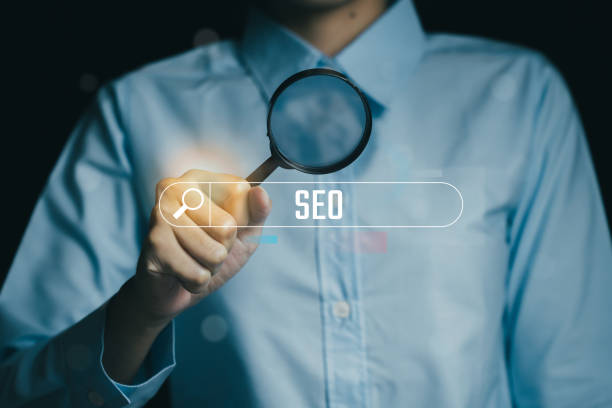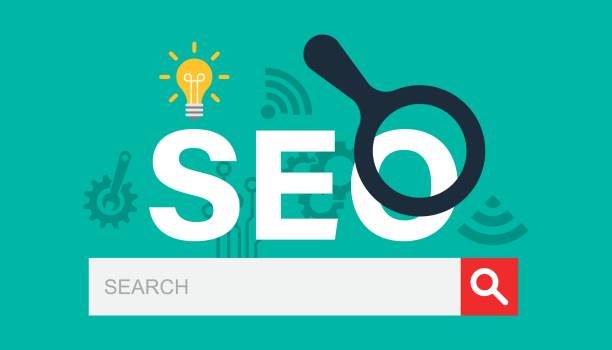Comprehensive Introduction to SEO and Its Importance in the Digital World

In the #Information_and_Communication_Age, an online presence is vital for any business or individual seeking visibility.
Among these, the unparalleled role of SEO (Search Engine Optimization) is more prominent than ever.
SEO is a process through which your website is optimized to rank higher in search engine results pages like Google.
This complex but efficient process involves a set of techniques and strategies, whose ultimate goal is to increase organic and high-quality traffic to your website.
The higher your site’s position in search results, the greater the likelihood of being seen by potential users.
Indeed, the growing importance of SEO in every online business, from small local businesses to large international companies, is undeniable.
This becomes particularly important when millions of websites are competing for users’ attention.
In this section, we will explain and teach the fundamentals of SEO to give you a basic and comprehensive understanding of this vital concept.
SEO is no longer just an option; it’s a necessity for survival and growth in today’s digital ecosystem.
Did you know that a weak corporate website takes away many opportunities from you daily? Solve this problem forever with professional corporate website design by Rasaweb!
✅ Create a powerful and reliable image for your brand
✅ Attract new customers effectively and increase sales
⚡ [Get Free Website Design Consultation]
On-Page SEO: Content Optimization Strategies

After a general understanding of SEO, it’s time to delve into the details, and one of the most important sections is On-Page SEO.
This part of SEO refers to all actions you can take within your website to improve its ranking.
Among the most important factors of On-Page SEO are keyword optimization, Title Tags, Meta Descriptions, proper use of Heading Tags (H1, H2, H3, etc.), and image optimization.
Choosing relevant and targeted keywords that your users are most likely to search for is the cornerstone of any successful On-Page SEO strategy.
Then you should use these keywords naturally and without overstuffing them into your content.
Meta descriptions, while not directly impacting rankings, play a crucial role in attracting user clicks from the search results page.
Additionally, page loading speed, mobile responsiveness, and URL structure are also influential factors in On-Page SEO.
This section provides practical guidance for implementing these techniques on your website, ensuring your content is not only appealing to users but also easily understandable and rankable for search engines.
Off-Page SEO and Building Website Authority

Alongside On-Page SEO, Off-Page SEO holds special importance in increasing your website’s credibility and authority in the eyes of search engines.
This part of SEO refers to activities performed outside your website, with the primary goal of building authority and increasing referring domains to your site.
The most important factor in Off-Page SEO is building high-quality and relevant backlinks.
Backlinks are essentially a vote of confidence from other websites to your content, and the higher their number and quality, the higher your site’s authority with search engines.
Of course, quality takes precedence over quantity; backlinks from spammy or irrelevant sites are not only unhelpful but can also harm your ranking.
Social media activity, influencer marketing, and brand mentions also indirectly play a role in Off-Page SEO.
A successful Off-Page SEO strategy requires a deep understanding of how search engines work and natural link-building approaches.
In this specialized section, we will examine various link-building methods and how to evaluate backlink quality so that your website can become a reputable authority in its field.
Table 1: Comparison of Link-Building Methods
| Method | Description | Advantages | Disadvantages |
|---|---|---|---|
| Content Marketing | Producing valuable content and publishing it on other websites to attract natural links. | Natural, sustainable, increases brand credibility. | Time-consuming, requires production of very high-quality content. |
| Digital PR | Creating news and media-coverable events to receive links from reputable news sites. | High-quality links, increased brand visibility. | Costly, requires creativity and strong communication. |
| Outreach | Direct contact with website owners and bloggers to request links. | Targeted, possibility of controlling link quality. | Time-consuming, requires communication skills. |
Technical SEO: Powerful Infrastructure for Ranking

Technical SEO is another vital part of SEO that focuses on optimizing the technical aspects of a website to help search engines crawl and index it more effectively.
This section includes items such as site loading speed, mobile compatibility, URL structure, Robots.txt file, Sitemap.xml, Structured Data (Schema Markup), and SSL certificate.
High page loading speed is not only important for users but is also considered a Google ranking factor.
Optimizing images, compressing code, and using Content Delivery Networks (CDNs) can help increase speed.
Also, with the increasing use of mobile for searching, website compatibility with mobile devices is of high importance.
Checking and fixing crawl errors, ensuring that search engine bots can easily find and index all important pages of your site, are among the main actions in Technical SEO.
Structured data also helps search engines better understand your site’s content and display it in richer formats (such as Rich Snippets) in search results.
This analytical section helps you strengthen your website’s technical infrastructure to best support SEO.
Did you know that poor online store design can drive away up to 70% of your potential customers? Rasaweb revolutionizes your sales with professional and user-friendly e-commerce website design.
✅ Significant increase in sales and revenue
✅ Full optimization for search engines and mobile
⚡ [Get Free Consultation from Rasaweb]
Producing Valuable Content with an SEO Approach

Content is king; this statement holds true more than ever in the world of SEO.
Producing high-quality, engaging, and user-relevant content is the heart of any successful SEO strategy.
The content you produce should not only include targeted keywords but also answer user questions, provide comprehensive and accurate information, and create real value for the audience.
Types of content can include blog articles, videos, infographics, podcasts, guides, and even thought-provoking content that encourages user interaction.
When creating content, pay attention to the user’s Search Intent.
Are they looking for information? Do they intend to buy? Or do they want to perform an action? Understanding this intent helps you write content that precisely addresses the user’s needs.
Engaging or educational content that keeps users on your site longer sends positive signals to search engines.
For successful SEO, simply producing content is not enough; you must optimize it, update it regularly, and promote it through various channels.
Each piece of your content should have a specific goal and contribute to improving the overall SEO ranking of the site.
The Role of Keywords in a Successful SEO Strategy

Keywords are the backbone of any SEO strategy.
They create a bridge between what users search for and the content you provide.
Keyword research is the process of discovering the words and phrases that your target audience types into search engines.
This process is not limited to finding frequently used words but also includes understanding the user’s intent behind each search, the competition for various keywords, and identifying opportunities for long-tail keywords.
Long-tail keywords are longer, more specific phrases that have lower search volume but offer higher conversion rates because users who search for them usually have a more specific intent.
Strategic use of keywords in titles, meta descriptions, headings, body text, and even image file names helps search engines understand the main topic of your page.
However, it is important to avoid “keyword density” or excessive repetition; this will not only fail to help your ranking but can also lead to penalties from search engines.
The goal is to naturally and intelligently integrate keywords into high-quality and valuable content to establish a strong SEO foundation.
Vital SEO Tools for Performance Analysis and Improvement

Performing SEO without the right tools is almost impossible.
These tools allow you to monitor your website’s performance, identify weaknesses, and discover opportunities for improvement.
Among the most important and widely used SEO tools are Google Analytics and Google Search Console.
Google Analytics provides a comprehensive view of your website’s traffic, user behavior, and traffic sources, while Google Search Console gives you vital information about how your site appears in search results, crawl errors, high-ranking keywords, and backlinks.
In addition to Google’s free tools, there are other specialized tools like Ahrefs, SEMrush, and Moz that offer more advanced capabilities such as in-depth keyword research, competitor analysis, backlink auditing, and rank tracking.
These tools, by providing analytical and informational data, help you optimize your SEO strategies and make more informed decisions.
Proper use of these tools not only facilitates the SEO process but also allows you to measure the impact of your actions and continuously improve your website’s performance.
Table 2: Popular SEO Tools
| Tool Name | Type (Free/Paid) | Main Use | Key Features |
|---|---|---|---|
| Google Analytics | Free | Traffic and User Behavior Analysis | Comprehensive reports, goal tracking, real-time insights. |
| Google Search Console | Free | Monitoring Site Performance in Search | Keyword reports, index coverage, crawl errors, links. |
| Ahrefs | Paid | Keyword Research and Backlink Analysis | Huge backlink database, competitor analysis, keyword research. |
| SEMrush | Paid | Competitive Marketing and SEO Analysis | Keyword research, ad analysis, technical SEO, content creation. |
Google Algorithms and Their Impact on SEO

Search engines, especially Google, are constantly updating their algorithms to provide the best and most relevant results to users.
Understanding Google’s algorithms and their changes is essential for every SEO specialist.
Algorithms like Panda (related to content quality), Penguin (related to backlink quality), Hummingbird (natural language processing), and regular Core Updates can significantly impact website rankings.
Google’s goal has always been to improve user experience and combat spamming methods.
Therefore, the SEO approach should always focus on providing real value to the user, not just trying to trick algorithms.
These updates can cause significant fluctuations in rankings, so continuous monitoring and adapting strategies to changes are highly important.
Understanding these changes and how they work helps you keep your explanatory SEO strategies flexible and avoid potential penalties.
Following SEO news and analyses from reputable sources is an integral part of maintaining good rankings.
Tired of losing business opportunities due to not having a professional corporate website? Worry no more! With Rasaweb’s corporate website design services:
✅ Your brand’s credibility and professionalism will increase.
✅ You will attract more customers and sales leads.
⚡ Get a free consultation now to get started!
Common SEO Mistakes and How to Avoid Them

On the path to SEO, there are common mistakes that can render your efforts fruitless and even lead to penalties from search engines.
One of the biggest mistakes is using Black Hat SEO techniques such as hidden keywords, buying low-quality backlinks, or duplicate content.
These methods might yield short-term results, but in the long run, they will definitely harm your website.
Ignoring user experience (UX) is also a major mistake.
Slow site speed, non-responsive design for mobile, complex navigation, and low-quality content drive users away and turn into negative signals for search engines.
Lack of proper keyword research, producing low-value content, inappropriate URL structure, or failure to optimize images are other common mistakes.
It’s important to regularly check your site for SEO, analyze Google Search Console reports, and pay attention to its warnings.
This section provides guidance on identifying and avoiding these common SEO pitfalls to make your optimization path smoother and more successful.
Vigilance and staying up-to-date with best practices are key to success in this field.
The Future of SEO and New Trends in Search

The world of SEO is never static and is constantly evolving with technological advancements and changes in user behavior.
New trends in search indicate that future SEO will focus more on user experience, searcher intent, and the use of artificial intelligence.
Voice search, image search, and Augmented Reality (AR) are among the areas experiencing significant growth and require new optimization approaches.
Optimizing for voice search involves focusing on longer keywords and more natural language.
The concept of E-A-T (Expertise, Authoritativeness, Trustworthiness) has gained increasing importance in page ranking, especially in health and financial sectors.
Artificial intelligence also plays an increasing role in search engines’ understanding of content and user behavior.
A deeper analysis of these trends shows that future SEO will rely less on technical tricks and more on providing exceptional content and excellent user experience.
Adapting to these changes and investing in core SEO concepts prepares you for success in tomorrow’s search ecosystem.
So, one must be ready for an exciting and challenging future in SEO.
Frequently Asked Questions
| Question | Answer |
|---|---|
| What is SEO? | SEO, or Search Engine Optimization, is the process of increasing the quality and quantity of website traffic by improving the site’s ranking in natural (organic) search engine results like Google. |
| What are the main types of SEO? | SEO is divided into three main categories: On-Page SEO, Off-Page SEO, and Technical SEO. |
| What does On-Page SEO include? | On-Page SEO includes optimizing elements within the website, such as keywords, Title Tag, Meta Description, content, URL structure, images, and internal links. |
| What is Off-Page SEO? | Off-Page SEO refers to activities outside the website that help improve its ranking, such as Backlink Building, social media marketing, and Brand Mentions. |
| What is Technical SEO? | Technical SEO deals with optimizing the technical aspects of a website to help search engines crawl and index it better. This includes site speed, mobile-friendliness, site structure, Sitemaps, and Robots.txt file. |
| What role do Keywords play in SEO? | Keywords are phrases that users enter into search engines. Proper and targeted use of relevant keywords in content and site elements helps search engines understand your page’s topic and display it for relevant searches. |
| What is a Backlink and why is it important? | A backlink, or inbound link, is a link from one website to another. Backlinks act as a “vote of confidence” from other sites for search engines and play an important role in a site’s authority and ranking, especially if they come from reputable sites. |
| What is the impact of quality content on SEO? | Quality, relevant, comprehensive, and unique content not only attracts and retains users but also shows search engines that your page is valuable. This helps improve ranking, reduce Bounce Rate, and increase user time on site. |
| Why is site loading speed important for SEO? | Site loading speed is an important ranking factor for Google. Faster sites provide a better user experience, have lower bounce rates, and are preferred by search engines. |
| Is SEO a one-time process? | No, SEO is a continuous and long-term process. Search engine algorithms are constantly changing, competition is increasing, and site content also needs updating. Therefore, SEO requires continuous monitoring, analysis, and optimization. |
And other services of Rasaweb Advertising Agency in the field of advertising
Smart Conversion Rate Optimization: An innovative platform for improving sales growth with intelligent data analysis.
Smart Social Media: A new service for increasing customer acquisition through attractive UI design.
Smart Conversion Rate Optimization: Designed for businesses seeking online growth through custom programming.
Smart Advertorials: A specialized service for increasing site visits based on custom programming.
Smart Customer Journey Map: Designed for businesses seeking online growth through user experience customization.
And over hundreds of other services in the field of internet advertising, advertising consultation, and organizational solutions
Internet Advertising | Advertising Strategy | Advertorials
Sources
Rastin Web SEO Guide
SEO Smile SEO Checklist
What is SEO? Mizbanfa
SEO Training on Aparat (Archive)
? Are you ready to transform your business in the digital world? Rasaweb Afarin, a leading digital marketing agency, paves your path to growth by providing comprehensive services including custom website design, SEO, and advertising campaign management.
📍 Tehran, Mirdamad Street, Next to Bank Markazi, Southern Kazeroon Alley, Ramin Alley, No. 6


